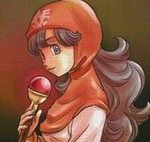IS RNG GOOD OR BAD?
Posts
I'm curious what people think of randomness in games. Drop, encounter, critical and damage rates in a game are usually random, some more than others. So how much randomness is good and how much bad?
Randomness, as long as the percentage are set to something known or preestablished, it is probably good. Completely random with no idea of what to expect is probably bad (utter chaos)!
Random can be fun, as it varies the player's experience. On the other hand, the more you vary the experience, the less control over it you have. It's harder to know what level the player will be, what damage they will do, how much gold they have, etc if all of these values have been affected with a large amount of random variables. And if you can't gauge theses things, it's harder to balance the gameplay.
In short, random is cool, but going overboard can alter the experience from player to player too much.
In short, random is cool, but going overboard can alter the experience from player to player too much.
My opinion is that the RNG should only ever help you. It should never hurt you. If you can lose a battle or permanently fail a task because the RNG went against you, that's poor design, in my humble opinion.
Randomness can be a very fun gameplay element, when used correctly. To me, these are the important things to keep in mind when using randomness in games:
That's my short and sweet opinion, but I wrote a longer, detailed article on designing games with randomness in mind that sounds right up your alley!
EDIT: Oh, I guess to answer the question posed in the title quickly: It's very good if used well, and very bad if used poorly.
I feel that way about most individual elements of games - it's not about how good or bad they are, but how well they fit into the rest of the elements you're using.
- Critical thought should be used when adding randomness as a game element. Ask yourself, "How does random chance make this game more fun?" Look at other games with random chance and figure out how randomness makes them more or less fun.
- Randomness can be used to reduce player agency (the amount of control the player has over their fate). However, in the right design, randomness can be used to create a different kind of agency and skill altogether.
- Randomness can be used to create suspense, mystery and surprise. However, if the player doesn't realize an element is random, this effect is lost.
That's my short and sweet opinion, but I wrote a longer, detailed article on designing games with randomness in mind that sounds right up your alley!
EDIT: Oh, I guess to answer the question posed in the title quickly: It's very good if used well, and very bad if used poorly.
I feel that way about most individual elements of games - it's not about how good or bad they are, but how well they fit into the rest of the elements you're using.
RNG is too complex to just say it's good or bad.
RNG is particular good for the developer himself, because it's making playing your own game much less tedious. You will probably be motivated more to test it again and again the more random it is.
For others it depends. In general I like it when everything is fixed and I just play my JRPG the way it is supposed to be. Randomness often just screams "lazy developer". Like the really boring dungeon design in Persona 3.
When I play MMORPGs however, I really like randomness.
RNG is particular good for the developer himself, because it's making playing your own game much less tedious. You will probably be motivated more to test it again and again the more random it is.
For others it depends. In general I like it when everything is fixed and I just play my JRPG the way it is supposed to be. Randomness often just screams "lazy developer". Like the really boring dungeon design in Persona 3.
When I play MMORPGs however, I really like randomness.
Yes, randomness should NEVER have a negative impact.
I remember one of the Final Fantasies had a monster which could, at a very slim chance, cast a spell which instantly killed all your characters, giving you Game Over. How fun!
I remember one of the Final Fantasies had a monster which could, at a very slim chance, cast a spell which instantly killed all your characters, giving you Game Over. How fun!
author=Solitayre
My opinion is that the RNG should only ever help you.
author=Amy
Yes, randomness should NEVER have a negative impact.
This doesn't really jive. The caveat here is that a player may be expecting a result in the upper, positive range and will thus be affected negatively by anything lower.
If you're going to use the RNG in a meaningful way, it should be done so to provide a dynamic experience for each individual playthrough without putting the player's overall ability to complete the game at risk. Fire Emblem and the Diablo series do this very well.
And...
author=Amy
I remember one of the Final Fantasies had a monster which could, at a very slim chance, cast a spell which instantly killed all your characters, giving you Game Over. How fun!

It wasn't a "slim chance". If he didn't cast Death 10 and wipe out your party on turn 1, he would do it on turn 2. It forced the player into a Run and Save Every Step situation.
LockeZ

I'd really like to get rid of LockeZ. His play style is way too unpredictable. He's always like this too. If he ran a country, he'd just kill and imprison people at random until crime stopped.
5958
author=Dyhaltoauthor=Solitayre
My opinion is that the RNG should only ever help you.author=Amy
Yes, randomness should NEVER have a negative impact.
This doesn't really jive. The caveat here is that a player may be expecting a result in the upper, positive range and will thus be affected negatively by anything lower.
What makes this difficult is that it's all psychology. It's impossible to have RNG without both positive and negative results. Having one automatically means you also have the other. The only difference is how good of a result the player was "expecting." But controlling players' expectations is really tricky. You don't expect to get a critical hit, but do you expect at least one in every ten attacks to be a critical hit? If you have a 20% crit chance and you base your strategy around assuming you'll crit at least one in a ten-round-battle, you have a 90% chance of succeeding; it's a very safe expectation, but it'll fail one in every ten battles.
Of course, if the game is easy enough that you can fail every roll and still succeed, then the RNG doesn't do anything but change how fast your battles end. But that's not interesting to me. I'd rather have ways to manipulate it. Give the enemies a chance to cast instant death, but give me a spell that always happens first on a round and makes my party immune to instant death. Give the enemies a 25% chance to drop a piece of equipment I need, but let me keep fighting until I get it if I want to, and maybe let me buy it later in the game for a hefty price if I don't get it.
If you have non-boss battles that the players has to fight many times, randomness can help make them different from each-other without you having to design thirty new enemies per dungeon. That's the biggest benefit of having randomness in combat, in my opinion. No one wants to experience the exact same battle over and over. Stuff has to happen a little differently for it to stay interesting.
Going with what LockeZ said, a lot of how well RNG works is how it feels and is presented to the player! In Binding of Isaac, you get pills that you can eat and may damage you or give you full health - but you can also not eat them, or save them for a situation where it's safe to eat them, or find items that make eating them safe. And with that many options in play, the RNG starts to feel a lot more fair!
Poker (and most card games) are games where your fate is largely guided by RNG, but there's enough of a game there that people have fun anyway... although the money factor might influence that.
Poker (and most card games) are games where your fate is largely guided by RNG, but there's enough of a game there that people have fun anyway... although the money factor might influence that.
Imo, Fire Emblem does NOT do RNG right. Instant permadeath through critical hit double attacks is not fun. I think Fire Emblem would be one of the games which would be a lot better if the RNG was removed (except maybe for AI decisions).
LockeZ

I'd really like to get rid of LockeZ. His play style is way too unpredictable. He's always like this too. If he ran a country, he'd just kill and imprison people at random until crime stopped.
5958
The way Fire Emblem works is that you always can, and are absolutely expected to, put yourself in a situation where you have a 0% chance of being crit to death. If you fail to do this, the game says, "You deserve a game over, but I'm going to give you a random chance of surviving anyway, just to be nice."
It's extremely brutal but if the difficulty doesn't turn you away then I'm not sure why the RNG would, because the RNG in Fire Emblem only enters into play at all if you've already messed up. Which I honestly think is a good way of dealing with it.
In fact I guess I'd say that's one of the two main ways of dealing with RNG that I totally approve of:
- Random chance to survive when you messed up and deserve to fail
- Randomly get different challenges, but overcoming those challenges is a matter of skill
It's extremely brutal but if the difficulty doesn't turn you away then I'm not sure why the RNG would, because the RNG in Fire Emblem only enters into play at all if you've already messed up. Which I honestly think is a good way of dealing with it.
In fact I guess I'd say that's one of the two main ways of dealing with RNG that I totally approve of:
- Random chance to survive when you messed up and deserve to fail
- Randomly get different challenges, but overcoming those challenges is a matter of skill
author=LockeZ
Random chance to survive when you messed up and deserve to fail
What I really like is the idea that one mistake doesn't usually mean failure, but several mistakes inevitably lead to failure - that way, any randomness associated with each mistake doesn't feel as cheap, because it wasn't any one dice roll - it was a culmination of them. And, if during this process you had some control over the dice, like how and when they were rolled, it makes you feel like you had enough agency to direct your fate and you chose poorly.
As an example, RPG boss battles should never come down to one dice roll (see: boss randomly used "Death", player loses). They're fun when, over the course of time, the dice results add up and you can react to each one individually. When a boss crits, you might heal instead of whatever you were planning. When you dodge an attack unexpectedly, you get a lucky break you can use to your advantage in many ways. It reduces the impact of bad dice and feels more like skill because you have a chance to react to each one.
author=RyaReisender
Imo, Fire Emblem does NOT do RNG right. Instant permadeath through critical hit double attacks is not fun.
Locke summed up most of it, but also the fact that each team's makeup may change based on the generosity of the RNG. One player's Oguma may be another player's Zealot. That 1 Defense you're shy on your second run may force you to backrow that unit. No two playthroughs will ever be the same.
And Fire Emblem 5 is possessed by the devil. It doesn't count. So many 99% Hit Rates missing...
LockeZ

I'd really like to get rid of LockeZ. His play style is way too unpredictable. He's always like this too. If he ran a country, he'd just kill and imprison people at random until crime stopped.
5958
author=slashphoenix
What I really like is the idea that one mistake doesn't usually mean failure, but several mistakes inevitably lead to failure - that way, any randomness associated with each mistake doesn't feel as cheap, because it wasn't any one dice roll - it was a culmination of them.
Yeah, that's a primary gauge of difficulty in a game. How many mistakes can you make and still keep going? Randomness can tie into this pretty well, as long as the player understands that X mistakes can mean a game over, and if he survived it was due to luck.
Fire Emblem is notoriously difficulty because even on the easy difficulty, the number of mistakes you're allowed to make is often just 1, unless you're lucky. It doesn't give you any more room for error on easy mode, it just adds more possible paths to victory. That's the other main way to gauge the difficulty of a game: how many of the options available to you are winning options? On easy mode it's like 30% of the available options, while on hard mode it's more like 3%.
Random generation and all that jazz can be great if it adds challenge and makes each playthrough new (L4D and Spelunky, for example), but it shouldn't solely just be there to piss you off; that's a no-go.
Well if you put it that way Fire Emblem is simply too hard. But I always felt RNG is the main cause of it. They could just remove critical hits and double attacks completely (for the enemy AND you) and I would have found it a lot more enjoyable (and easier).
I generally find RNG to be annoying, whether it rewards or punishes me.
The outcome of a game should be according to how I played it, and not how RNJesus decided it should go.
Consider that in Pokemon, a single Double Team can win an entire match - or have absolutely no effect at all!* Its all up to chance. Not very enjoyable. I haven't played any of the games since Ruby, but I've noticed a lot of the new moves have various, often dependable side effects, rather than just power/accuracy adjustments. That's a good sign. *Yes, there are moves like Swift, but you don't always have access to those in single-player.
Also consider how many games have bosses who can only be hurt when they decide to be hurt. It can be really obnoxious when the boss goes 10 minutes without allowing you to do anything to it.
I think RNG should be limited to making minor variations on the exact type and form of challenge the player faces, and should not affect the outcome of any (significant) actions, player's or enemy's. It should not be considered a balancing force, since lighting can strike the same place however many times it wants to. If you want to make your enemies' behaviors RNG-based, then you need to put in some kind of check to make sure that their more powerful options aren't used too many times in a row.
I know there's a lot of people who think their games would be really stale and boring if RNG didn't decide everything, but I think the real problem is that a lot of games are so brain-dead that these random occurrences are the only interesting things that ever happen.
The outcome of a game should be according to how I played it, and not how RNJesus decided it should go.
Consider that in Pokemon, a single Double Team can win an entire match - or have absolutely no effect at all!* Its all up to chance. Not very enjoyable. I haven't played any of the games since Ruby, but I've noticed a lot of the new moves have various, often dependable side effects, rather than just power/accuracy adjustments. That's a good sign. *Yes, there are moves like Swift, but you don't always have access to those in single-player.
Also consider how many games have bosses who can only be hurt when they decide to be hurt. It can be really obnoxious when the boss goes 10 minutes without allowing you to do anything to it.
I think RNG should be limited to making minor variations on the exact type and form of challenge the player faces, and should not affect the outcome of any (significant) actions, player's or enemy's. It should not be considered a balancing force, since lighting can strike the same place however many times it wants to. If you want to make your enemies' behaviors RNG-based, then you need to put in some kind of check to make sure that their more powerful options aren't used too many times in a row.
I know there's a lot of people who think their games would be really stale and boring if RNG didn't decide everything, but I think the real problem is that a lot of games are so brain-dead that these random occurrences are the only interesting things that ever happen.
Sooz


They told me I was mad when I said I was going to create a spidertable. Who’s laughing now!!!
5354
I kind of feel like some amount of RNG is part and parcel of RPGs because of their origin in dice-rolling tabletop games. If I wanted a game that relies solely on my skill, I'd play a platformer or something.
Of course, all random numbers all the time is probably not a fun way to do a game.* However, I tend to enjoy a level of luck and gambling in my games; it feels a little more "real" and exciting to me.
*I suppose there's a way to make it fun if it's The Gimmick, but that'd be beyond my designing skills.
Of course, all random numbers all the time is probably not a fun way to do a game.* However, I tend to enjoy a level of luck and gambling in my games; it feels a little more "real" and exciting to me.
*I suppose there's a way to make it fun if it's The Gimmick, but that'd be beyond my designing skills.
author=RyaReisender
Well if you put it that way Fire Emblem is simply too hard. But I always felt RNG is the main cause of it. They could just remove critical hits and double attacks completely (for the enemy AND you) and I would have found it a lot more enjoyable (and easier).
The biggest RNG problem in Fire Emblem was the stat-gain issue. Occasionally referred to as the "RNG Curse", there was a chance that your character would gain ZERO stats when leveling up, or only gaining stats that didn't help you, or ending up with 40 HP and 7 Defense. It was solved in Awakening with the ability to re-class as often as you want, and the option to play without perma-death.
Anyways, here's my opinion:
Good RNG:
- Random gold or loot from chests. (Not as in Rusty Sword/Excalibur random, but Steel Axe/Silver Sword random.)
- Skills or equipment that gives you a random chance to survive a fatal blow, reflect attacks, counter, etc.
- Random encounters.
- Random non-fatal events, unless you know going into said event that death is a possibility.
- Random chance of a skill inflicting a status effect.
- Weather!
Bad RNG
- Poor balance of critical-hit ratio.
- Chance to lose the game, unless game is based on luck. (Blackjack, slots, etc.)
- Possibility of never encountering a necessary or important event or character. If you have to keep going to a tavern everyday hoping to meet the one NPC you need to meet, but their attendance at the tavern is random, you might never finish the game.
- Extremely low chance of encountering an important monster. As in Star Ocean IV achievement requirement low.
- Chance of missing out on a legendary weapon. See: Final Fantasy XII




















